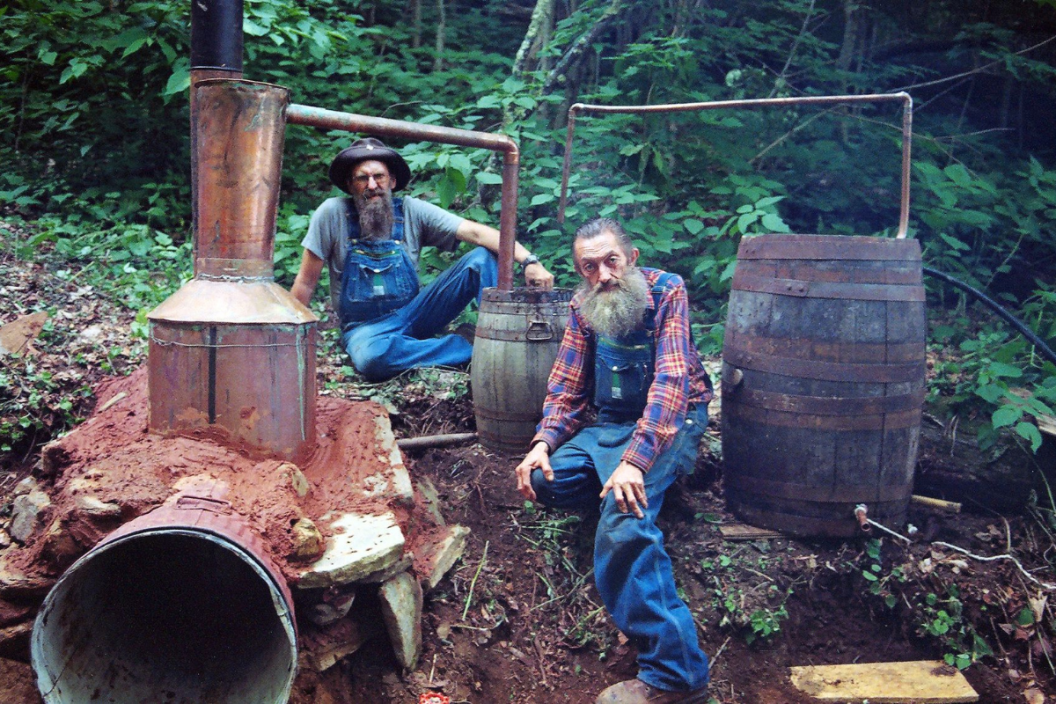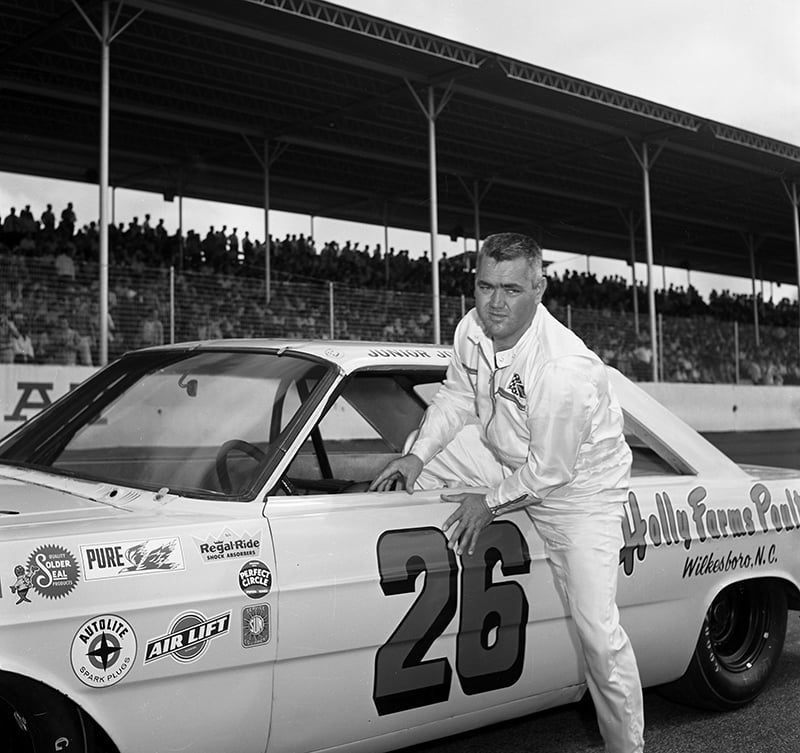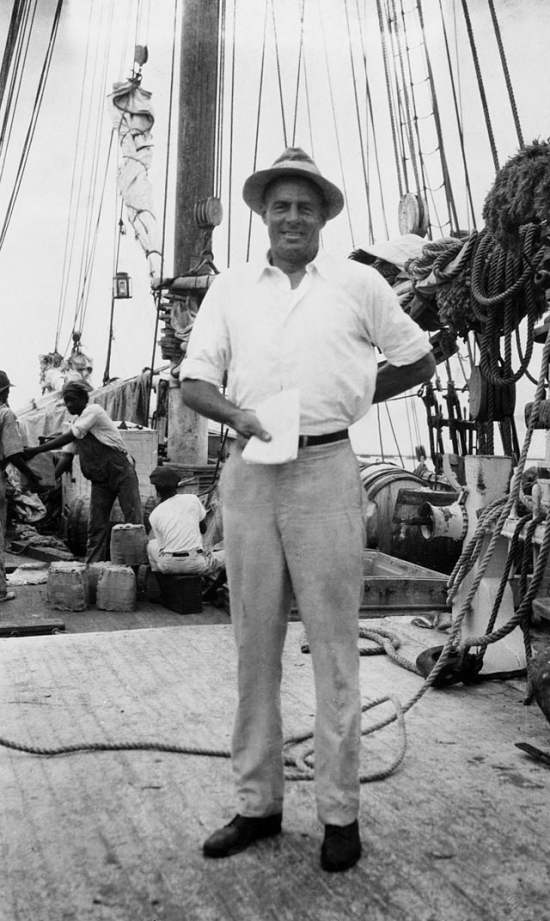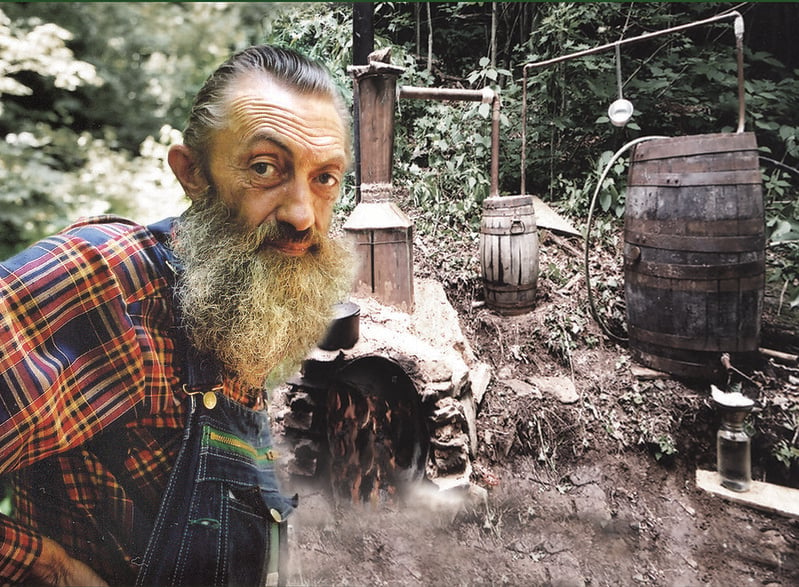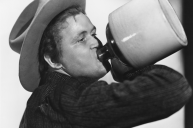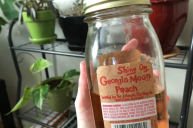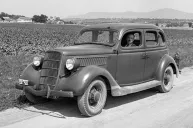Rot gut, likker, shine, white lightning, ruckus juice, whatever word you want to use for moonshine, it was the famous moonshiners and bootleggers who dedicated their life to this illegal liquor trade that made it possible. Without the bootleggers, nobody would have been able to get their shine. And without the moonshiners, it wouldn't even have existed.
Videos by Wide Open Country
While moonshiners and bootleggers were prevalent throughout the Appalachian region, the illegal trading spread far and wide, much further than the smoky mountains. For some, moonshining was a family tradition they were born into. For others, it was a profitable business during unprofitable times.
What is Moonshine?
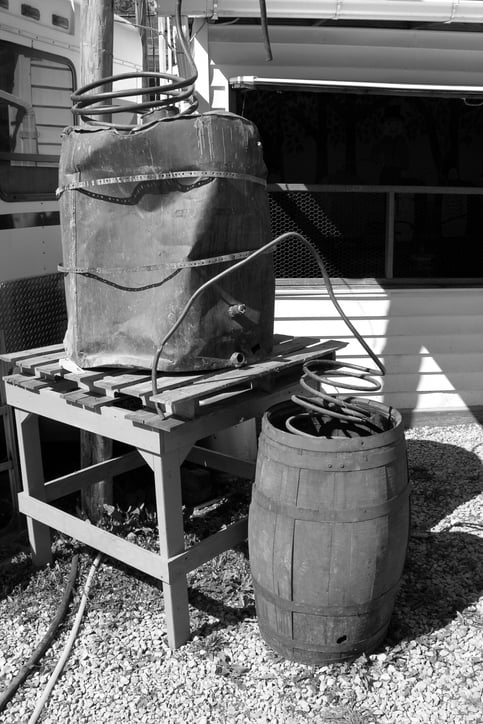
High-proof liquor with a fiery bite, this illegally-produced spirit got its name due to the tradition of creating the alcohol at night under the moonlight to avoid the law during the Prohibition-era.
While production could be found in some major cities, the Appalachian mountains were where the distilling of moonshine thrived due to its limited road network. Drivers or "runners" knew the roads and could outrun the cops if needed. This network of drivers later formed NASCAR after Prohibition ended and the drivers wanted to keep their skills sharp through organized races.
5 Famous Moonshiners Who Changed History
Among the many that joined into the illegal trade, there are a few whose ruthless acts and incorrigible efforts have elevated them to fame, deeply embedding them into American history. It is these famous moonshiners and bootleggers that we have to thank for making white lightning legal today - as long as you're a commercial distiller of course. So without further ado, from the good to the bad, here are the five famous moonshiners and bootleggers who shaped history.
5. Robert Glen "Junior" Johnson
Before Junior Johnson joined the NASCAR Hall of Fame, he was a famous moonshiner. In fact, if it weren't for runners like Johnson America wouldn't even have NASCAR - a little more on that in a bit. Born in Wilkes County, North Carolina, Johnson's ancestors were some of the first to make shine in Appalachia, dating as far back as the Whiskey Rebellion of 1791. With white lightning running through the family's blood, it was his fate to continue the tradition.
His introduction into the family business started with his father who had one of the largest stills in Wilkes County. According to History,
"so many cases of hooch were packed inside Johnson's house while he was growing up that he needed to climb over stacks of them just to reach his bed each night."
NASCAR
By the age of 14, Johnson was behind the wheel running shine. From the moment he got into the vehicle he was a natural. Outrunning the cops and pulling slick moves like the bootlegger U-turn, he made a name for himself.
This is where NASCAR comes in. Other famous moonshiners like Johnson began supping up cars and pulling tricky maneuvers to evade police. Trying to have the fastest car, bootleggers began to race each other. As this caught on, onlookers began watching these so-called race cars, sometimes for money, and the rest is history.
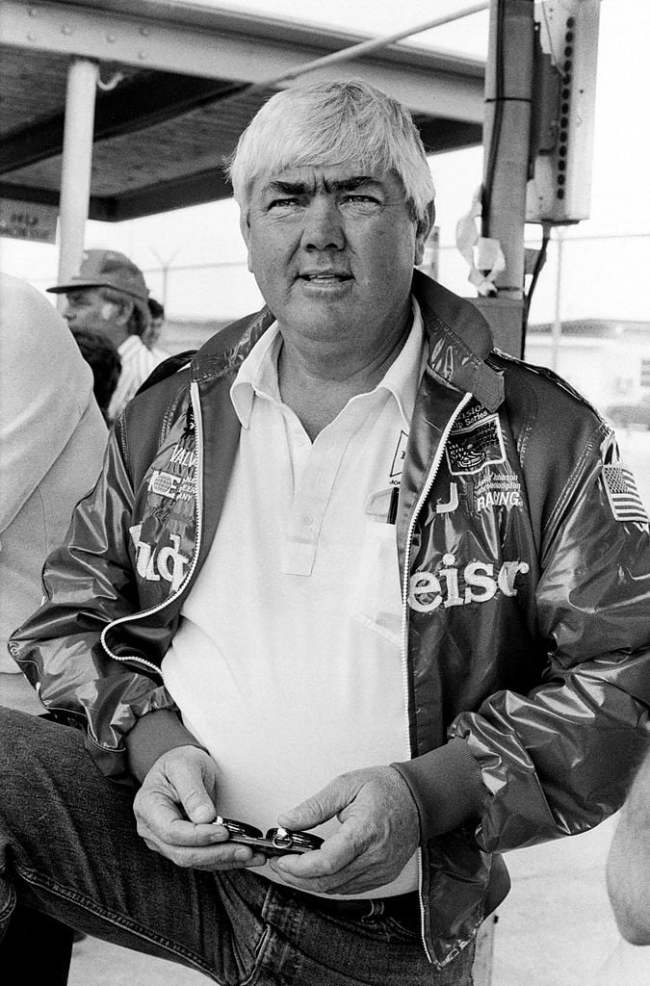
DAYTONA BEACH, FL - FEBRUARY 19, 1983 (Photo by Robert Alexander/Archive Photos/Getty Images)
While Johnson's quick moves on wheels could outrun the cops, his family couldn't outrun them at the moonshine still. They were eventually raided for over 7,000 gallons of moonshine, making it the largest raid in US history.
The trouble with the cops didn't stop there. Eventually, the famous moonshiner got caught firing up the still and did 11 months of time. Once out of the slammer, Johnson returned to racing which paved the way for his NASCAR career.
Winning over 50 races in his lifetime, he was inducted into the NASCAR Hall of Fame in 2010. He was even pardoned by President Ronald Regan for his moonshining conviction
Unlike other bootleggers and moonshiners, Johnson managed to turn his product into a thriving business that you've probably heard of Midnight Moon. Using the same recipe as his daddy, the family legacy continues to live on today.
4. Al Capone
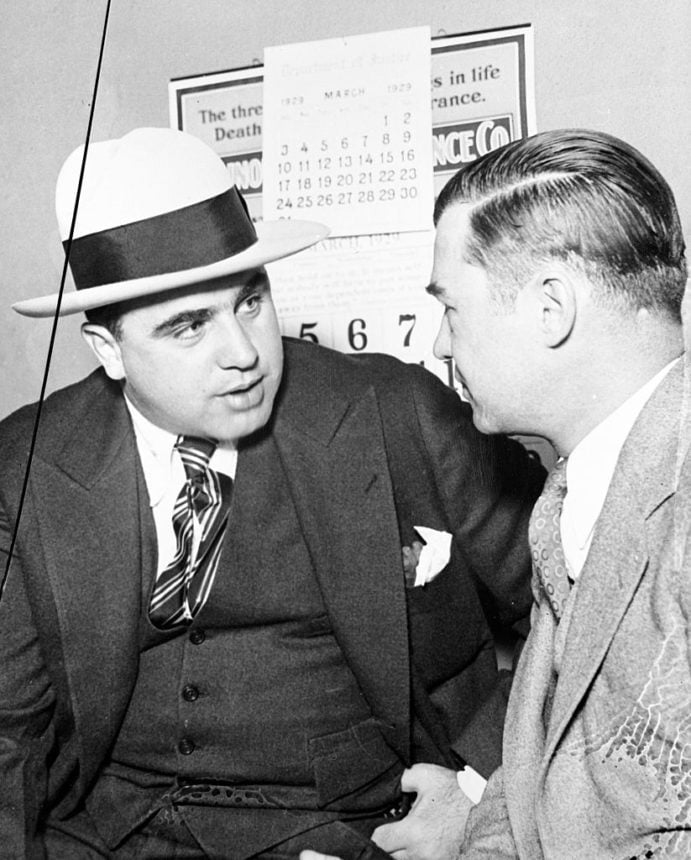
Al Capone and attorney William F. Waugh, Chicago, Illinois, 1929. (Photo by Chicago History Museum/Getty Images)
If there were one bootlegger that has been romanticized above the rest thanks to Hollywood, it's Al Capone. For those that know him as "Scarface" he earned the nickname after getting his face slashed in a bar for making a lewd comment about some guy's sister. Known mostly for his acts as an American gangster, he led the Chicago Outfit during Prohibition. Coming from a poor Italian immigrant family growing up in the slums of Brooklyn, Capone had a rough start from the get-go.
By the age of 14, he was kicked out of Catholic school for hitting back a teacher who had struck him for misbehaving. After that, he never returned. With no school to hold him, he began running errands for Johnny Torrio who became his mob mentor and partner. After a hit on Torrio's life, Torrio left for Italy and Capone became the new boss in town.
For Capone, violence and popularity as a boss went hand in hand. He lived a lavish lifestyle that was funded by bootlegging, distilling, prostitution, and gambling. The press was captivated by him, and he was at a time portrayed as being somewhat of a martyr of the people against Prohibition. His organized crime operation dominated the Chicago bootlegging scene. In order to keep him at that top, acts of violence and murder became common business practices.
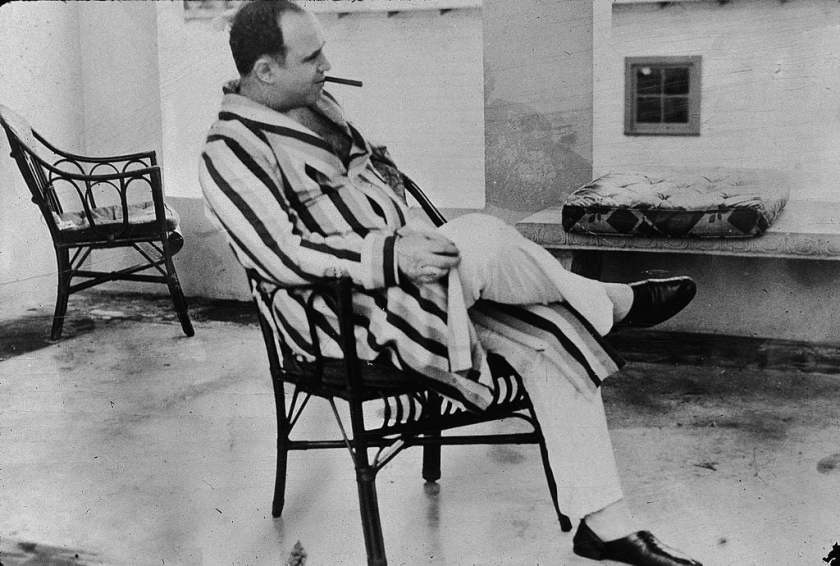
American gangster Al Capone relaxes in his vacation home, Miami, Florida, 1930. (Photo by New York Times/Getty Images)
Not everyone respected the hold he had on Chicago. According to History, rival "Bugs" Moran tried to kill both Torrio and Capone to get in on the Chicago bootlegging action. He even made an assassination attempt on Capone's best hit man, "Machine Gun" Jack McGurn. That's when Capone and McGurn sent in gunmen to kill Moran.
They massacred seven of his men, but as Moran caught word he was able to flee. The event became known as the "St. Valentine's Day Massacre". After the event, Capone was blamed by the media for the murders despite being in Florida at the time, and he became known as Public Enemy Number One.
Despite his link to the murder, Capone was finally sentenced to federal prison for income-tax evasion. His days of violent racketeering were over.
3. Enoch Lewis "Nucky" Johnson
If you've ever watched an episode of Boardwalk Empire, you've no doubt heard about Enoch Lewis "Nucky" Johnson. Over six feet tall and famous for sporting a red carnation in his suit pocket, he was best known as the kingpin of Atlantic City during Prohibition.
According to The Mob Museum, the legendary moonshiner's rise to kingpin all started when he began to work his way up the political ladder of corruption. In 1908, he became Atlantic County sheriff, then was elected to executive secretary of the Republican Party.
While the political influence he gained would eventually lead to his control of Atlantic City, his time as sheriff didn't last long. The New Jersey governor began cracking down on all the Atlantic City corruption and Johnson was indicted along with the current boss Louis "The Commodore" Kuehnle. Johnson was let go, but The Commodore was convicted, paving the way for Johnson to take the reigns. Gaining profits off all prostitution, gambling, and illegal liquor in Atlantic City, he became a force to be reckoned with.
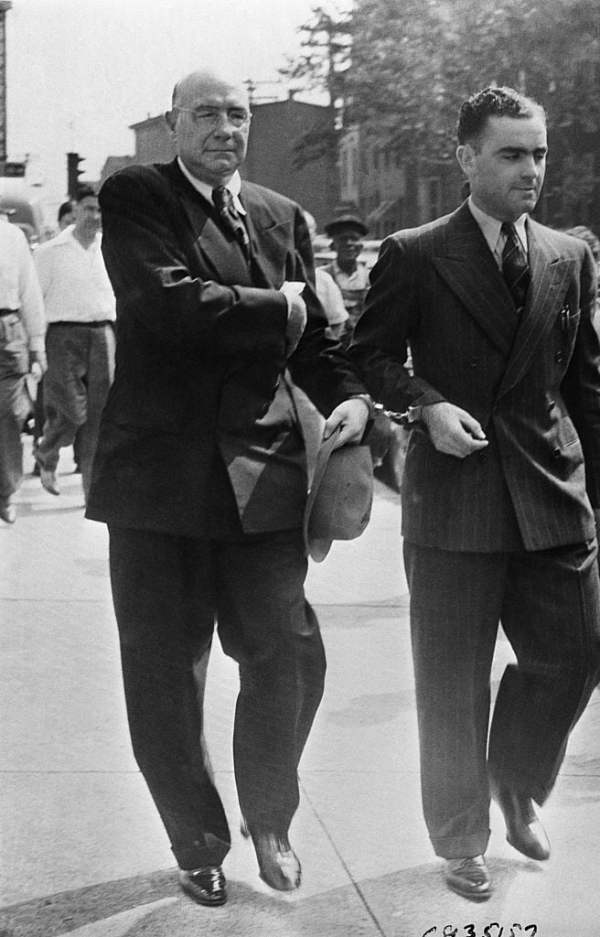
Enoch "Nucky" Johnson, Atlantic City, NJ (Getty Images)
Atlantic City was in a sense untouchable by Prohibition. The idea that booze was illegal was ignored and the sale continued. Johnson himself once said,
"We have whisky, wine, women, song and slot machines. I won't deny it and I won't apologize for it. If the majority of the people didn't want them, they wouldn't be profitable and they would not exist."
Soon his lack of apologies caught up to him, like many famous moonshiners of his day. He was tried and convicted for tax evasion. Although on Boardwalk Empire his character was murdered, the real story was Johnson lived to be eighty-five.
2. William Frederick McCoy
Who's "The Real McCoy"? That would be William Frederick McCoy. Also known as "Bill", he somewhat stumbled upon the bootlegging business as a sailor. During Prohibition, he was running a freight business with his brother. As land transportation was becoming more popular they found their business failing. Needing to make some money, they got into the rum-running business. After their first shipment from the Bahamas to Savannah, Georgia proved to be highly profitable, McCoy was in.
There was one problem, if the famous moonshiner was going to bootleg across the open seas he was going to need his own vessel. That's when he bought the 130-foot boat, the Arethusea. Outfitted with a speedy auxiliary motor and a concealed machine gun below deck, the boat was ready to haul all the contraband they could stow.
The only issue was the boat wasn't exactly incognito. That's when McCoy got the bright idea to dock offshore and use other local sea captains with smaller boats, who could easily get away from the Coast Guard, to haul off the goods. This sparked a chain of hundreds of boats transporting the illegal liquor and was eventually dubbed "rum row".
Unlike some of the other famous moonshiners, McCoy was known for moonshine that was never diluted - hence his nickname. His high-quality whiskey was the best in the business and he was even credited for the burlock - which is how he transported cases.
Eventually, his luck ran out. Hated by both the United States Coast Guard and organized crime alike, he finally surrendered to the Coast Guard after a gunfire battle. All that and McCoy was a non-drinker.
1. Marvin "Popcorn" Sutton
Of course, we wouldn't be talking moonshine without the man, the myth, the legend, Marvin "Popcorn" Sutton. The most recognized modern moonshiner, good old hillbilly Popcorn Sutton was born in Maggie Valley, North Carolina in 1949. After assaulting a 10-cent bar popcorn machine with a cue ball, he got the nickname "Popcorn". He was a scrawny, plaid shirt wearing man who sported a long beard, a heavy hillbilly Southern twang, and fathered more children than anyone could count. And he spent his entire life dedicated to home brewing moonshine.
Popcorn Sutton's Tennessee white whiskey and corn whiskey was known throughout Cocke County in East Tennessee, near Knoxville and Nashville. A single bottle of his potent mountain dew could be up to 160 proof. He used a secret family recipe and worked on stills he built around his cabin.
Featured in documentaries, The Discovery Channel TV series Moonshiners, and publishing his own book titled Me and My Likker, he caught the public's eye. He also caught the eye of the LAW.
Sutton spent his entire life having run-ins with the police. He was convicted of selling untaxed liquor, had been charged a couple of times for assault with a deadly weapon and possession of controlled substances, and sentenced for illegally producing liquor after he tried to sell 1,000 gallons to an undercover cop.
Sadly, it was these constant run-ins and his incorrigible efforts that would get the best of him. After his fifth conviction that sentenced him to 18-months of jail for illegally producing moonshine, Sutton took his own life rather than do any more time behind bars. Ironically, a few months after his death Tennessee passed a state law making it legal for micro-distilleries to do business.
Good or bad, there is one thing all these men had in common, they loved the moonshine - for one reason or another.
